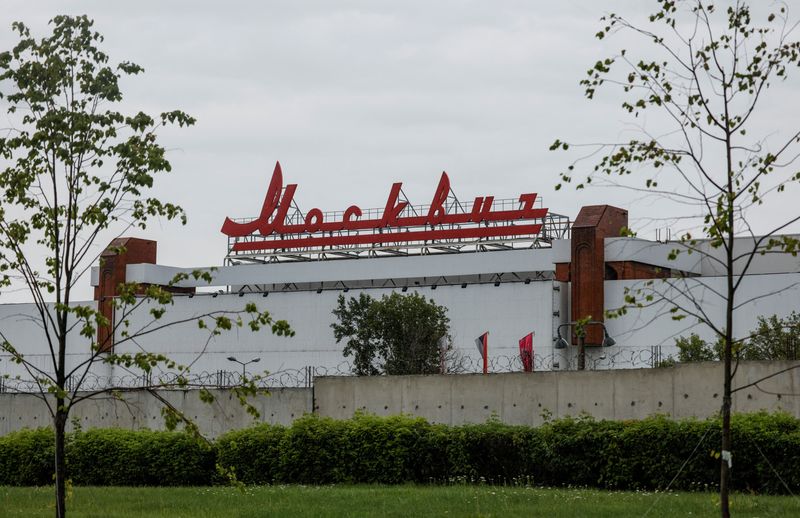
© Reuters. A view shows the logo of Russian automaker Moskvich at a plant in Moscow, Russia July 13, 2023. REUTERS/Maxim Shemetov
2/2
By Gleb Stolyarov and Alexander Marrow
(Reuters) – The Western automakers that dominated Russia’s car market left following Moscow’s invasion of Ukraine, leaving a slumping production and sales in their wake, with domestic producers and Chinese firms picking up the pieces.
Here is an overview of the fate of foreign carmakers’ assets in Russia:
RENAULT
One of the first Western carmakers to exit, France’s Renault (EPA:) in May 2022 sold its majority stake in carmaker Avtovaz and its Moscow factory with annual capacity of 150,000 vehicles to the Russian state, each for one rouble, sources told Reuters at the time. The deal gave Renault a six-year buyback option on its Avtovaz stake.
Moscow’s mayor hailed November’s production launch of the Soviet-era Moskvich at the plant as a historic brand revival. Two sources, who asked not to be identified as they are not authorised to speak to the media, told Reuters the Moskvich 3 model is a JAC Sehol X4 assembled in Moscow using kits purchased from a Chinese partner.
Moskvich told Reuters it works with a “foreign partner” but did not confirm ties to JAC. It said it would start to build more of the car locally later this year or in early 2024.
Russia’s Central Automobile and Engine Research and Development Institute (NAMI) – a state entity – acquired Renault’s Avtovaz stake.
Avtovaz, Russia’s leading carmaker, subsequently bought RN Bank, a joint venture between Italian lender UniCredit and the Renault-Nissan-Mitsubishi Alliance, for an undisclosed fee.
NISSAN
NAMI purchased Nissan (OTC:)’s Russian business for one euro in October with a six-year buyback clause, which the Japanese carmaker said cost it around $687 million.
That deal included Nissan’s production and research facilities in St Petersburg, with production of 100,000 units, as well as its sales and marketing centre in Moscow.
The plant, now owned by Avtovaz, was renamed Lada St Petersburg and produces Lada X-Cross 5s in cooperation with what Avtovaz calls an “Eastern partner”.
A source close to the company told Reuters that China’s FAW Group’s Bestune T77 compact utility vehicle is being used to produce Lada cars there. FAW did not respond to Reuters questions. Avtovaz declined to provide further details.
Avtovaz has said publicly it plans to begin localising production in 2024, using parts from suppliers in St Petersburg and the Leningrad region.
BMW, HYUNDAI, KIA
In Russia’s Kaliningrad exclave on the Baltic coast, Chinese Kaiyi cars are now being produced by carmaker Avtotor, which previously assembled BMW, Hyundai and Kia cars.
Avtotor told Reuters it also has agreements to produce cars for China’s BAIC and Shineray Group at the plant, which currently has capacity of 80,000 units.
Avtotor said it is working with “partial localisation of components” and plans to produce about 80,000 cars of the three Chinese brands this year. It is preparing for full production capacity in 2024.
Kaiyi, BAIC and SWM did not respond to requests for comment.
VOLKSWAGEN
Germany’s Volkswagen (ETR:) in May said it had sold its shares in Volkswagen Group Rus to Art-Finance, which is supported by autodealer group Avilon. The deal was worth 125 million euros ($140.3 million), according to a source familiar with the matter.
VW’s former Kaluga factory, which has annual production capacity of 225,000 vehicles, was renamed AGR Automotive by its new owner.
Avilon is in negotiations about a partnership with Chery automobile, the largest Chinese player in Russia, another source said. Chery and AGR Automotive declined to comment.
Deputy Prime Minister Denis Manturov said in June that VW has no buyback option.
MERCEDES-BENZ
Mercedes-Benz sold shares in its Russian subsidiaries to car dealer chain Avtodom, including its factory with production capacity of 25,000 units in the Moscow region. It has a six-year buyback option, although the German carmaker has said it does not expect to exercise that clause.
Avtodom told Reuters it is in talks with several partners about assembling premium Chinese cars there.
TOYOTA
Japan’s Toyota transferred its vehicle production plant in St Petersburg to NAMI in March. It is not yet clear which cars will be produced there, but a state-owned manufacturer may produce electric cars there, Russia’s Industry and Trade Ministry has said.
Industry and Trade Minister Denis Manturov said in June that Toyota has no buyback option.
FORD
Russian automaker Sollers in November said it was producing its Atlant and Argo light commercial vehicles (LCVs) at a factory in the Tatarstan region, where Ford Transit vans were previously produced. The plant has capacity to produce 85,000 vehicles annually.
China’s JAC Sunray model is being used in production, a source told Reuters. Sollers declined to comment.
($1 = 0.8911 euros)





